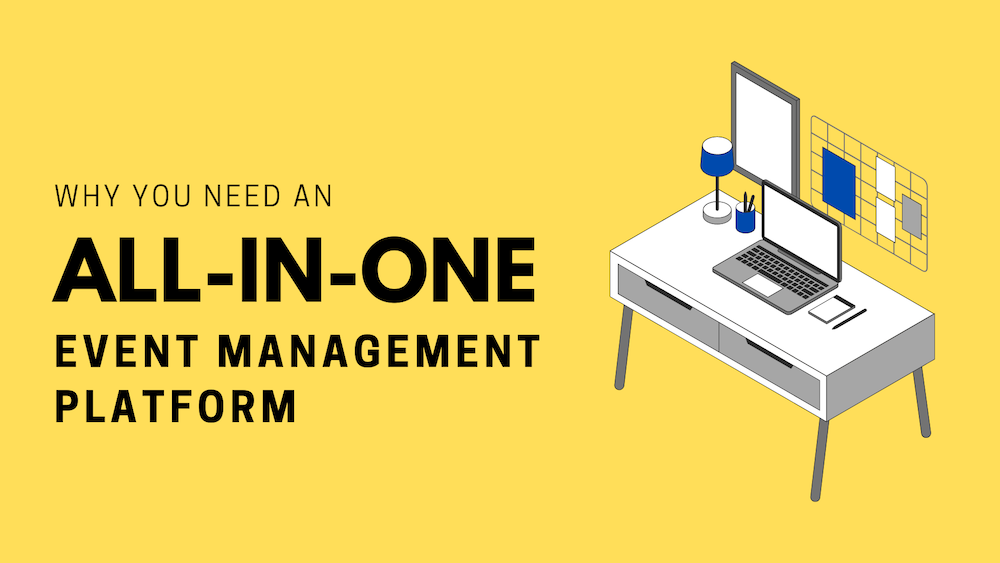Home > Blog > Event management software > Why You Need an All-In-One Event Management Platform

Events have long been a popular way for companies to improve their branding, forge profitable partnerships, and generate a steady stream of new leads and prospects. The average event has many moving parts traditionally managed by a range of separate applications, including an event CRM, email marketing software, abstract management software, event scheduling software and event ticketing software – each with one with its own learning curve and peculiarities to master. It’s challenging enough to manage every little detail when planning an event, but many applications cannot “talk” to each other and share data, which adds to the complexity. Fortunately, all-in-one event management platform includes all the features you need to plan, manage, and host an event. There’s one interface to learn, and all the modules can effectively share data to keep all team members on the same page.
If you’ve been considering streamlining your event management process, here’s how an all-in-one event management platform can help.
What is an All-in-One Event Management Platform?
An all-in-one event management software provides a single, consistent interface for planning and managing an event. They can handle booking and ticket sales, check-ins, abstract management & peer review, attendees engagement, event website creation, advertising, analytics, event CRM, and more.
Rather than use a range of disparate software that most likely can’t communicate with each other, all-in-one event management platforms keep all of your data in one place.
If you’ve had enough of juggling between apps where the left hand does not know what the right hand is doing, an all-in-one event management platform can solve most, if not all of your challenges.
What Does All-In-One Event Management Software Do?
The onslaught of the pandemic and its ongoing economic influence have made many businesses aware of the need to adapt to changing market conditions.
While live events have always been a popular marketing strategy for connecting with an audience, online or virtual events have become the go-to strategy for circumventing the challenges posed by social distancing and lockdown.
Virtual events quickly gained momentum, and quality event management software streamlined the transition. As lockdowns ease and we grow accustomed to life with COVID, hybrid events have been gaining recognition as a strategy for covering all bases.
A hybrid event has both a physical and online component and offers the potential for people who cannot physically attend the chance to engage with your content.
All-in-one event management platforms are essential for businesses that need to be able to pivot from a live event to a virtual one instantly.
The advantages of hybrid events as a strategy to expand markets and provide value to clients, partners, and customers further afield cannot be understated.
Industries that Could Benefit From an All-in-One Event Management Platform
A wide range of industries could benefit from an an-all-in-one event management platform, including:
Universities & Nonprofits
Keeping details about an event under lock and key is critical for universities & nonprofits. Event management software provides access to authorized individuals only while keeping attendee details on secure servers according to anti-spam and data privacy laws.
Finance and Investment Companies
Through automated bookings, marketing communications, online conferences, webinars, and seminars, investment firms and banks could benefit from an all-in-one event management platform.
Events can efficiently deliver a wealth of information in a short time, which is impossible with many other marketing methods like direct mail or email marketing.
Online and offline physical events are powerful tools to reach a broad audience, and an all-in-one event management platform can help increase attendance rates and engagement through their various features.
Legal and Accounting Firms
While the above industries are not totally reliant on face-to-face engagements, legal and accounting firms cannot say the same. Finance and legal matters are highly personal, so physical meetings are mandatory to forging long-term partnerships.
An all-in-one event management platform removes many of the logistical challenges of physical meetings and streamlines the processes for live meetings over digital channels like video conferencing.
Healthcare
All-in-one event management platform software can assist healthcare operators in creating bookings, managing appointments, arranging consultations, and taking payments in a secure environment
Advantages of an All-in-One Event Management Platform
Any type of investment for your business needs to be justified by the benefits it can provide. So, what advantages can an all-in-one management platform deliver to your company?
1. Reduce Event Planning Costs
Regardless of how critical an event is to your marketing strategy, the budget will always be a limiting factor. The more bang you can get for your buck, the greater will be the potential of your event to create the ROI you need. Event management platforms offer a wealth of ways to cut your costs.
A significant influence on your costs will be the time required for event planning. Traditionally, a business would use a range of disconnected software to handle the planning and implementation of the event, which could include a CRM, payment portal, web development software, email marketing software, and more.
Each application comes with a learning curve, and it’s pretty common for them to be incompatible from a data-sharing standpoint. Staff working with disconnected systems need to spend more time in meetings sharing information and ensuring they are all on the same page.
An all-in-one event management platform effectively removes all the bottlenecks associated with using different software for each aspect of the event. Collected data is easily shared between modules, so each department is instantly made aware of any updates.
2. Task Automation
The platform can also automate many event management tasks with trigger events, such as sending out relevant information and invoices after a ticket sale, event reminders and details, and updates to sales staff without having to schedule meetings.
The platform can send out thank you notes, track email open rates and move people through the sales funnel according to their behavior as they navigate your online content.
In the past, each of these tasks would have been performed by a staff member or through a range of disconnected systems requiring manual monitoring to ensure everything happens when it should.
Your sales and marketing teams will be free of the countless tasks that need to be done but don’t necessarily increase revenue. Instead, they can focus on connecting with leads and taking care of existing customers.
3. Streamline Your Next Event
When you have planned and successfully pulled off an event with the help of all-in-one event management platform software, the processes you created can easily be incorporated into the next one.
4. Collect Valuable Data From Attendee Behavior
It’s difficult to collect data from attendees milling about at a live event, but when you take your event online or create a hybrid version, a wealth of data becomes available regarding user engagement and behavior.
As attendees and sponsors engage online, you can use the data trail to draw actionable insights from a wide range of activities. This feature not only gives you insider knowledge about what your audience found most appealing but also what didn’t work so well.
For example, you can set goals like a set number of leads you need to generate from your event. As the event progresses, you can track this information in real-time and use it to adjust your strategy to take advantage of trends.
5. Make Strategic Decisions
When you have amassed all of your data, you can run them through analytics and make strategic investment decisions on future events based on your insights. If something wasn’t successful or didn’t produce a decent enough ROI to cover your costs, there’s not much point in repeating it in your next event.
An all-in-one event management platform delivers a cohesive set of data so you can tweak your formula for better results, improve the user experience, streamline the registration process, and test different versions of your landing pages.
When you make decisions based on data rather than guesswork, event planning becomes a lot more streamlined and a lot less stressful.
6. Marketing Tool Integrations
While an all-in-one event management platform will go a long way to reducing your workload by integrating many tools in one place, there will be some you can’t do without.
This is where marketing tool integration comes in handy. For example, the Dryfta all-in-one event management software includes integration for email marketing software like Mailchimp.
You can also deliver more value and convenience to your clients through Stay22, an interactive map that helps with Airbnb accommodation, hotel bookings, and a convenient map for directions.
Other integrations you will benefit from include payment gateways such as Stripe, PayPal, Square, and PayTM. Those four will cover the vast majority of payment methods your attendees will have access to.
You can quickly update your social media followers with the ability to publish to Facebook, Twitter, and LinkedIn directly from the platform. Update your event schedule, and your subscribers will receive an instant update on their synched Google calendars.
Popular CRMs are also catered to, including Highrise, Salesforce, and Insightly, so you can continue to work in a familiar environment while keeping all your data in one place.
And of course, Zapier integration delivers almost limitless options for connecting more than 750 apps and associated trigger events. With Zapier integration, you have the ability to automate just about every aspect of your event management strategy.
So, with all of the integrations mentioned above, you have everything you need to build an automation flow that is largely hands-off and can save you a great deal of time and money.
7. Increase Brand Awareness
Brand awareness generates loyalty, regardless of the industry you are in. Whether hosting a corporate event or launching a new product, creating an exceptional event will leave a favorable impression and generate buzz around your company name.
Consistency is key to a successful event, but it’s challenging to present a unified image across all of them. Potential attendees will see one interface for payments, an email that doesn’t match up visually, and a website that creates uncertainty about the business they are connecting with.
An all-in-one event management platform creates a connection across every interaction your attendees will have with your company. It will deliver a straightforward and streamlined process that will impress them with your efficiency and attention to detail.
The platform also ensures client interactions happen automatically, so they don’t miss out on important information and updates.
If you have struggled in the past to create a unified experience across a bunch of different platforms, then integrated all-in-one event management platform software like Dryfta will be the solution to your problems.
Modernize Your Event Management Processes Today
An all-in-one marketing platform connects all departments across an organization inside a familiar environment to reduce learning curves and the struggle to get disparate systems to talk to each other.
Online and hybrid events are now an essential part of doing business in an often uncertain economy. Platforms like Dryfta are the key to bringing it all together and building a consistent brand image.
From managing bookings and email marketing to client communications and delivering timely updates, a well-designed all-in-one event management platform is a critical tool that helps you deliver the best event experience possible for your staff, your clients, partners, and sponsors.
Related Searches
- Top 10 Event Management Software for Nonprofits
- Streamlining Event Management with New Updates
- Building Enterprise-Grade Event Management Software
- Streamline Event Management with the Latest Updates
- Why Dryfta is the Ultimate Event Management Solution
- Got a University Event? An All-in-One Management Platform Saves Time and Money!
- 10 Reasons to Use Event Management Software
- Questions to Ask When Choosing University Event Software
- 4 Benefits of Cloud-Based Event Management Software
- Tips for Maintaining Professionalism in Event Management
- How Women Can Thrive in Event Management
- Are Event Management Apps Worth It? Benefits for Your Conference
- How Event Management Software is Reducing Human Roles





